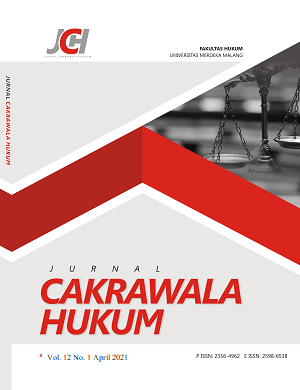Perkembangangan peran pecalang sebagai lembaga keamanan adat di masyarakat Bali Indonesia
DOI:
https://doi.org/10.26905/idjch.v12i3.7093Keywords:
Development, Role of Pecalang, Custom.Abstract
The island of Bali is known as one of the world's tourist destinations with all its unique traditions and customary laws. The Balinese have a traditional security institution known as the Pecalang whose role is different from that of the police. The purpose of this article is to identify the position of Pecalang according to Regional Regulation Number 4 of 2019 concerning Traditional Villages and the development of the role of Pecalang. The method used is a mix of methods, namely normative and empirical methods. The results show that the existence of Pecalang is regulated in Law Number 9 of 1979 concerning Village Government and Regional Regulation Number 4 of 2019 concerning Traditional Villages. Pecalang is formed in each of the customary village residents (pekraman) who have the task of maintaining security and order. The role of pecalang is currently experiencing development, which leads to the business, and can even be used as a political tool. What stands out is the case of the closure of the Hare Krsna hostel where the function as a security guard was instead used as a tool by the village to bring order to religious groups or sects that were allegedly not in accordance with community traditions. The police should have been involved because they thought it was a religious matter and their area. The regulation of pecalang duties needs to be re-examined in the Perda so that its function as a guardian of order is clear and not vice versa.
How to cite item: Indrayanti, K. (2021). Perkembangangan peran pecalang sebagai lembaga keamanan adat di masyarakat Bali Indonesia. Jurnal Cakrawala Hukum, 12(3), 294-302. doi:https://doi.org/10.26905/idjch.v12i3.7093.
Downloads
References
Arka, I Wayan. 2019. Sinergitas Pecalang dan Polisi Dalam Sistem Keamanaan Regional. dalam Seminar Nasional INOBALI. Universitas Dwijendra.
Arthadana, Made Gede. 2020. Kewenangan Pecalang Mengatur Keamanan dan Ketertiban Upacara Adat di Desa Adat Seraya Kabupaten Karangasen. Jurnal Hukum dan Kebudayaan. Fakultas Hukum Universitas Hindu Indonesia Denpasar. Volume 1, Nomor 1 April.
Citra, Made Emy Andayani dkk. 2018. Kelembagaan Pecalang Desa Adat Kutuh. E-Journal Universitas Mahasaraswati. Denpasar.
Delta, Ria. 2016. Kewenangan Wilayatul Hisbah Dalam Proses Penanganan Perkara Pidana. Justicia Sains. Universitas Sang Bumi Ruwa Jurai, Vol 1, No 2.
Gede Indra Prama. 2012. Pecalang: Dinamika Kontestasi Kekuasaan di Bali. Jurnal Lakon. Universitas Airlangga. Vol. 1 No. 1 Mei.
Laila, Khotbatul. 2019. Hukum Progresif sebagai Solusi Kebebasan Berpendapat dengan Asas Demokrasi Pancasila. Jurnal Cakrawala Hukum. Universitas Merdeka Malang. Volume 10 No. 2 Desember.
Mahadewi, Ni Made Anggita Sastri. 2014. Pecalang Simbol Kekuatan Budaya Bali. Jurnal Ilmiah Sosiologi. Universitas Udayana. Vol 1 No 2.
Nahuddin, Yusuf Eko. 2020. Hubungan agama dengan Pancasila dalam perspektif konstitusi. Jurnal Cakrawala Hukum. Universitas Merdeka Malang. Volume 11 No. 3 Desember.
Suarnata, I Wayan Gede. 2013. Pergeseran Fungsi dan Peranan Pecalang Terhadap Pelaksanaan Swadharmanya dalam Desa Adat (Studi Kasus di Desa Adat Besakih, Kecamatan Rendang, Kabupaten Karangasem). Jurnal Pendidikan Kebudayaan. Universitas Pendidikan Ganesha. Vol 1, No 2.
Sugiantiningsih, A.A Putu. 2019. Peran Pecalang Dalam Kehidupan Masyarakat Hindu di Bali (Suatu Realitas Sosial tentang Pecalang di Kota Denpasar) Bali.
Suryawan, I Ngurah. 2015. Bali, Narasi dalam Kekuasaan: Politik dan Kekerasan di Bali. Yogyakarta: Ombak.
Additional Files
Published
How to Cite
Issue
Section
License
Copyright (c) 2022 Jurnal Cakrawala Hukum

This work is licensed under a Creative Commons Attribution-ShareAlike 4.0 International License.
Authors who publish in this journal agree to the following terms:
The copyright of the received article shall be assigned to the journal as the publisher of the journal. The intended copyright includes the right to publish the article in various forms (including reprints). The journal maintains the publishing rights to the published articles. Authors must agree to the copyright transfer agreement by checking the Copyright Notice column at the initial stage when submitting the article.










